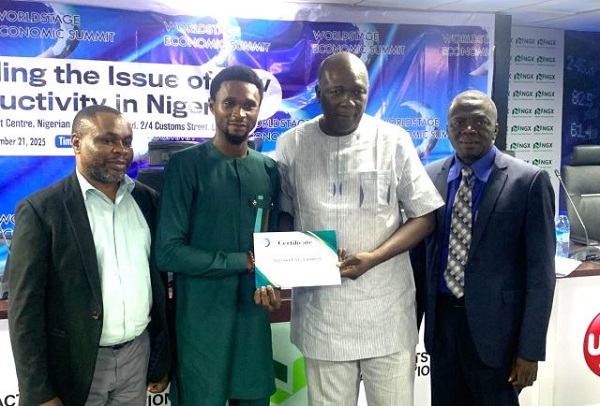…As Nigeria continues to face deep productivity constraints that weaken economic competitiveness, limit job creation, affect welfare of millions
The Managing Director/Chief Executive Officer of the Bank of Industry, Dr. Olasupo Olusi has advocated a multiple players alignment for Nigeria to overcome low productivity.
Speaking on Friday at the 2025 WorldStage Economic Summit (WES), the BoI boss represented by Lanre Babalola, Group Head, Climate Finance and Sustainability, Bank of Industry said this year’s theme of WES 2025 –Tackling the Issue of Low Productivity in Nigeria—is both relevant and urgent.
Recognising that BOI cannot act alone, he said the country needed infrastructure that supports industry, policies that reduce bottlenecks, universities that produce industry-ready talent, and private sector collaboration that accelerates innovation.
“No single institution—not even BOI—can solve this independently. But together, we can create an ecosystem where every Nigerian business has a fair chance to thrive,” he said.
“That is why gatherings like this summit are critical. They enable us to step back, reflect on the root causes of our productivity challenges, and design solutions anchored in data, collaboration, and practical experience. Today is an opportunity for us to ask the tough questions: How do we move from exporting raw materials to producing high-value products? How do we strengthen supply chains and reduce leakages? How do we modernize our MSMEs, the backbone of our economy? How do we build a workforce equipped for the demands of a modern, innovation-driven world?”
As he encouraged bold and collaborative thinking, he said “Nigeria’s story is one of resilience, creativity, and immense potential. Our people are not afraid of hard work. What they need is the enabling environment to convert that hard work into prosperity.
“At the Bank of Industry, we remain committed to being a strong and reliable partner in this journey. We are ready to innovate, to collaborate, and to continue investing in enterprises that can transform our economy from one of consumption to one of production.
“Productivity is the engine that powers national prosperity. It is what transforms effort into outcomes, ideas into industries, and talent into tangible progress.”
He said at the Bank of Industry, the conversation is not abstract as every day they interfaced with the real faces behind Nigeria’s productivity challenge.
“We see the factory owner who can only run one shift instead of three because of power issues. We see the agro-processor who cannot expand because they lack modern equipment. We see the small business with incredible demand but inadequate working capital. We see young Nigerians with brilliant ideas but limited access to skills, mentorship, or finance,” he said.
“These are not just statistics; these are the people we serve. And that is why, for us at BOI, improving productivity is a mission, not a metric. It is at the heart of why we exist.”
He spoke about the mandate of BoI to catalyze domestic production, create jobs, and enhance industrial competitiveness being fundamentally about unlocking productivity across sectors.
“Whether through long-term financing, structured working capital, credit guarantees, cluster support, or technology adoption, our goal is consistent: to help Nigerian enterprises work better, produce more, and compete smarter,” he said.
“Over the years, we have seen the transformative impact that targeted financing can have when it is combined with technical support and an enabling environment. We have supported manufacturers who now export, agro-processors who have doubled capacity, local brands that have replaced imports, and MSMEs who have grown from micro-level operations into structured businesses employing dozens. These successes affirm that Nigerians are not unproductive; they are simply under-enabled.
“This is why BOI continues to strengthen our interventions along key thematic areas—Climate & Sustainability, Youth & Skills, Digital Economy, MSMEs, Infrastructure, and Gender.”
He listed the positive impacts of the themes as lever for productivity in form of ; When we promote renewable energy solutions, we reduce operating costs and strengthen industrial uptime; When we invest in technology and digital capabilities, we improve efficiency and unlock new business models; When we empower youth with skills, we create a workforce that can compete in the industries of the future; When we support women-led businesses, we expand national output and tap into an underutilized segment of the economy.
The Bank of Industry therefore advised that the WES’ convening should be used as a turning point—a moment “where we move from diagnosing the problem to scaling the solutions. The time for productivity-led growth is now, and BOI stands ready to support it every step of the way.”
He commended the organisers for sustaining this important platform for dialogue and policy reflection—one that continues to gather some of the brightest minds in business, government, academia, and development.
Other speakers at the summit held at the Nigerian Exchange, Lagos include Mr. Olanipekun Olukoyede, Executive Chairman, Economic and Financial Crimes Commission (EFCC) and Dr Abidemi Adegboye, Ph.D (Economics), Lecturer at University of Lagos.


Comment here